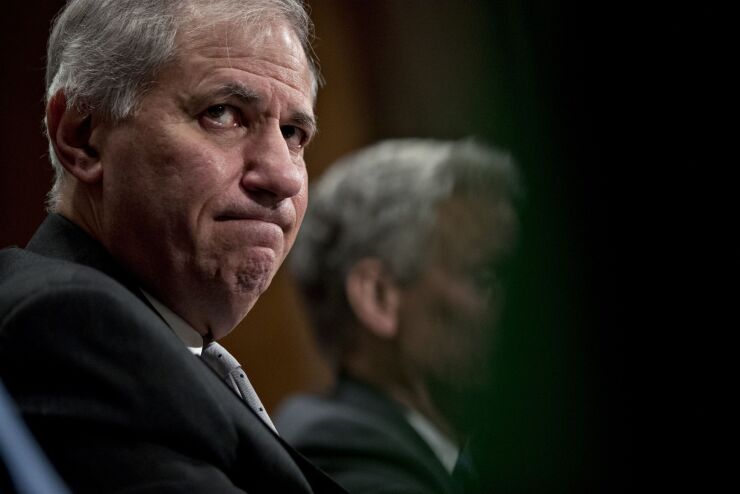WASHINGTON — The White House's puzzling decision to announce its choice of two Republican nominees for the board of the Federal Deposit Insurance Corp. set off waves of surprise throughout financial policy circles on Tuesday.
The choice of Travis Hill as vice chair of the FDIC board could unseat current acting Chairman Martin Gruenberg, according to the FDIC bylaws that say the vice chair leads the agency in the absence of a Senate-confirmed chair. While the White House said that a nomination for chair is "forthcoming," sources familiar with the matter say there has been no decision on a pick.
"Everyone is wondering what this is all about and no one knows," said Thomas Hoenig, former FDIC vice chairman and former president of the Federal Reserve Bank of Kansas City.

It would also be unusual to tap Republicans for the minority-held seats on the FDIC board without an accompanying chair, even if the bylaws didn't dictate that the vice chair should lead the agency in the current setup.
"Usually you don't necessarily see a Democratic president announcing a nomination of two Republican appointees to an agency where there are vacancies and it's not super urgent to have them," said Keith Noreika, executive vice chairman of Patomak Global Partners' banking supervision and regulation group, and former acting comptroller of the currency who served on the FDIC board in that capacity. "So the first thing is there is a big package that's coming, and what does that entail? Does it entail a new FDIC chair, does it entail some kind of permanent nomination to the OCC?"
The Republican nominees — particularly Jonathan McKernan, who most recently worked under Senate Banking Committee ranking member Sen. Pat Toomey, R-Pa. — appear designed to grease the wheels in the Senate, paving the way for eventual Democratic chair nominations. Hill previously served as policy chief for former FDIC Chair Jelena McWilliams, who was popular among Republican lawmakers.
"It does feel strange that they did not announce the new chair as a package deal when they nominated the two Republicans supported by Sen. Toomey," said Todd Baker, a senior fellow at the Richman Center for Business, Law & Public Policy at Columbia University and managing principal of Broadmoor Consulting.
Even the decision to move forward with any nominations is surprising. Most believed the plan, after two contentious confirmation hearings for other financial regulation posts — those of Sarah Bloom Raskin and Saule Omarova — was to let Gruenberg and acting Comptroller of the Currency Michael Hsu finish out their terms. That way, the Biden administration could advance its financial regulation priorities without another public defeat.
The decision to announce Republican nominees to the FDIC board has put renewed pressure on Democrats to find a chair nominee that can withstand the grueling confirmation process.
One of the easiest paths forward would be to nominate Gruenberg, the long-serving board member of the FDIC who has already served as chair on several occasions. But if the White House didn't nominate Gruenberg with the pair of Republicans, some financial policy observers said they believe that means there's another candidate waiting in the wings.
"It feels like if it was going to be Marty Gruenberg they surely would have done it then, as Gruenberg is a very well-known figure in D.C. and there are no skeletons in his closet. So if he was the choice there would be no reason to delay it," Baker said. "So that suggests that they have another candidate in mind who had not completed the vetting process."
Financial regulatory policy in general has not been a core policy focus for the Biden administration, but some of the administration's priorities wind their way through the FDIC nonetheless — cryptocurrency regulation, financial inclusion and climate risk, to name a few.
While Gruenberg has addressed those issues, he's done so in a measured way. The Biden administration could want the option to name someone to the chair at the FDIC who would be more aggressive, in the mold of Rohit Chopra, director of the Consumer Financial Protection Bureau, Hoenig said.
"I'm suspecting that they would want someone who would be more active," Hoenig said. "If they're willing to fill up the board, then they'd want the chair to be someone who is more activist and be able to work with Chopra on things that are already on trade with the FDIC and the CFPB."

To be sure, there's little risk of the two Republican choices for the board being advanced in the Senate without a Democratic chair. Sen. Sherrod Brown, D-Ohio, has control over when and if the confirmation process gets started, and he said this week that he won't advance Hill or McKernan unless they were part of a package that included a Democratic chair.
When that happens and the full slate is confirmed, the FDIC will have a full board for the first time since 2015. The five-person board is designed to have a chair of the majority party, along with the heads of the OCC and the CFPB, and a vice chair and additional board member of the minority party.
The lack of the full board has fueled complaints in recent years from policy watchers and former officials who complain that the agency has become more political. Particularly, the addition of the head of the CFPB was added after Dodd-Frank, and that person tends to have a different agenda than the other banking-focused regulators.
"The head of the CFPB tends to be highly political," said William Isaac, who served as head of the FDIC under President Jimmy Carter. "When you start putting other people on the board who don't have a strong banking focus, I think it dilutes the FDIC and it moves it away from its very intensive focus on the quality and stability of the banking system."





